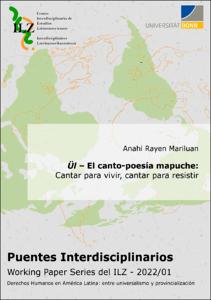Ül - El canto-poesía mapucheCantar para vivir, cantar para resistir

Ül - El canto-poesía mapuche
Cantar para vivir, cantar para resistir

| dc.contributor.author | Rayen Mariluan, Anahi | |
| dc.date.accessioned | 2022-06-21T12:14:28Z | |
| dc.date.available | 2022-06-21T12:14:28Z | |
| dc.date.issued | 2022 | |
| dc.identifier.uri | https://hdl.handle.net/20.500.11811/9889 | |
| dc.description.abstract | El artículo intenta poner de manifiesto las expresiones musicales del pueblo mapuche,2 canto, poesía y relato, como formas de resistencia del pueblo mapuche. El canto mapuche, denominado ül, es una manifestación histórica que cumple una función vinculada a la transmisión de saberes culturales. Se trata de un medio de expresión humana que se entiende dentro de un complejo marco performático donde confluyen sentidos espirituales, físicos y filosóficos. Esta práctica sostiene y fortalece la memoria e historia de un pueblo. Parte de estos cantos tiene una profunda relación con la oralidad como característica, así como el valerse de ésta para la transmisión del mapuzungun (lengua del pueblo mapuche), que significa habla de la tierra. Las ciudades del sur de Argentina y Chile aglutinan considerable población mapuche, que se traslada entre campo y ciudad, tras la pérdida de sus espacios territoriales en el siglo XIX. Estos desplazamientos implican el movimiento y recreación de instrumentos musicales y cantos en contextos nuevos. Se observan, por ende, escenarios sonoros en nuevos lugares con sentido de memoria y arte, que fortalecen un discurso de la resistencia. | en |
| dc.description.abstract | Ül – the Mapuche song-poetry: singing to live, singing to resist
This article aims at demonstrating the Mapuche people’s musical expressions, which combine singing, poetry and narration as tools of Mapuche resistance. The Mapuche song, known as ül, is a historical manifestation that fulfils a function related to the transmission of cultural knowledge. It presents a medium of human expression that is understood within a complex performative framework where spiritual, physical, and philosophical meanings converge. This practice upholds and strengthens the memory and history of this nation. A part of these songs maintain a profound relationship with orality as a distinctive trait. In this context, orality is also used to transmit the Mapuche language, called mapuzungun, which translates to “the language of the earth”. The cities located in South Argentina and Chile are home for a considerable number of people with Mapuche origins, who moved from the country to urban areas upon the loss of their territories during the 19th century. Those displacements implicated the movement towards and the recreation of musical instruments and songs in new contexts. Therefore, musical scenes are beeing observed within new locations full of recollective and artistic meaning, strengthening the discourse of resistance. | en |
| dc.format.extent | 9 | |
| dc.language.iso | spa | |
| dc.relation.ispartofseries | Working Paper Series Puentes Interdisciplinarios ; 01 | |
| dc.rights | In Copyright | |
| dc.rights | Namensnennung - Nicht kommerziell - Keine Bearbeitungen 4.0 International | |
| dc.rights.uri | http://creativecommons.org/licenses/by-nc-nd/4.0/ | |
| dc.subject | pueblo mapuche | |
| dc.subject | música mapuche | |
| dc.subject | arte | |
| dc.subject | resistencia política | |
| dc.subject | canto | |
| dc.subject | Mapuche people | |
| dc.subject | mapuche music | |
| dc.subject | art | |
| dc.subject | political resistance | |
| dc.subject | songs | |
| dc.subject.ddc | 100 Philosophie | |
| dc.subject.ddc | 300 Sozialwissenschaften, Soziologie, Anthropologie | |
| dc.subject.ddc | 400 Sprache, Linguistik | |
| dc.subject.ddc | 460 Spanisch, Portugiesisch | |
| dc.subject.ddc | 490 Andere Sprachen | |
| dc.subject.ddc | 800 Literatur, Rhetorik, Literaturwissenschaft | |
| dc.subject.ddc | 860 Spanische und portugiesische Literatur | |
| dc.title | Ül - El canto-poesía mapuche | |
| dc.title.alternative | Cantar para vivir, cantar para resistir | |
| dc.type | Arbeitspapier | |
| dc.identifier.doi | https://doi.org/10.48565/bonndoc-26 | |
| dc.publisher.name | Centro Interdisciplinario de Estudios Latinoamericanos | |
| dc.publisher.location | Bonn | |
| dc.rights.accessRights | openAccess | |
| ulbbn.pubtype | Erstveröffentlichung |




